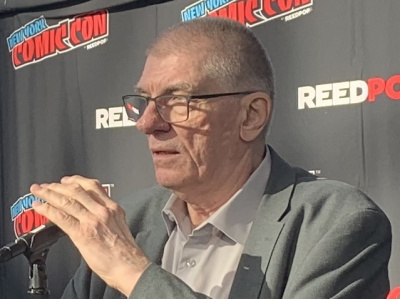 On election day, a grim forecast of how political divisions could tear apart everything comics culture has built in the 21st century.
On election day, a grim forecast of how political divisions could tear apart everything comics culture has built in the 21st century.Over the weekend, political journalist Ezra Klein posted a provocative analysis of Gamergate at his news site, Vox, arguing that the amorphous, often bitterly misogynistic controversy in the videogaming community is actually a proxy for larger cultural anxieties that have already divided our politics.
"The Gamergate fight is now being partly driven by forces that have nothing to do with the video gaming industry, or even with gamers," writes Klein. "Forces that are very good at making these kinds of conflicts worse and deeper. Forces that will be around long after Gamergate dies down. Forces that will create the next Gamergate."
Klein sees these forces originating in the same psychology of partisanship that characterizes national politics in the US. In fact, his long article begins with several paragraphs citing sociological research data showing how we unconsciously align ourselves ideologically around issues that have nothing to do with politics in the ordinary sense of public policies and outcomes. "Politics," he writes, "isn’t about tax cuts; it’s about tribes."
The rage of the "true fans." On one side is the "original" tribe; the true believers who feel justified by their identity, their historical position and the intensity of their attachment to define the nature of culture--whether it’s something as specific as gamer culture or as broad as authentic Americanism--for everyone else. Others are welcome, as long as they acknowledge the fundamental legitimacy and supremacy of this group.
The troubles start when newcomers try to redefine the culture in a broader way. Dissidents frame this in terms of social justice and inclusion, but originalists feel it as a loss of their core defining identity.
GamerGaters are more or less explicit about this point. Scrape away the surface arguments about journalistic ethics and ignore, if you can, the sexual insecurity and misogyny: most GamerGate folks I’ve talked to are sick and tired of games being reviewed and discussed on the basis of how socially relevant their storylines are, how many female characters are represented, and other issues that, in their view, are subordinate to the real point of gaming, which is how cool and playable the actual gaming experience is.
Then they are incredulous that others don’t simply acknowledge they are right about this. Then they get angry that they don’t get to be right about this just by virtue of their privileged (and self-evident) status as "real" gamers: after all, "it’s our culture; we’ll show them who’s boss."
And then it gets ugly. Really freakin’ ugly.
Can it happen in comics? The gaming community happens to be the one stuck with this problem right now. And despite the fact that videogames are an enormous global industry, it feels like something that’s still isolated in a pocket of the pop culture universe, unlikely to spread unless you come into direct contact with the bodily fluids of the infected.
Unfortunately, all the essential ingredients of Gamergate are scattered around comics culture like leaky specimen jars in the basement of the CDC. The same tensions exist between the traditional base of older, male superhero comics readers and the more diverse younger demographic. Big publishers face the same conundrum of pandering to old-style fanboys or trying to reach a wider audience, and often step on the same kinds of landmines as their counterparts in the gaming industry. Every weekend, another massive comic convention rubs old-timers’ faces in the reality that everything has changed, that all the old customs of the hobby that they know and love (and helped build) are being yanked from their grasp and remade in the image of consumers rather than fans. Arguments about "fake geek girls" remain depressingly common, along with occasional disgusting attempts to silence female voices.
Every so often, you hear a more pointed political appeal; for example, that conservative political views are being marginalized within comics and that the good vs. evil purity of comics has been supplanted by leftist "moral relativism." This type of argument seems deliberately engineered to create explicit ideological divisions within comics culture that mirror the broader debates in national politics.
It is only by luck that these tensions haven’t coalesced into the unified field of resentment, grievance and reaction that we’ve seen on the gaming side. If it ever should, the impacts will be far more consequential.
The last redoubt. I’d argue that one of the big reasons for the explosion of comics as a commercial and cultural phenomenon since 2000 is that it is the one part of American society where political divisions are, if not absent, largely irrelevant. Injecting partisan politics into fan discussions is generally frowned on, allowing the maintenance of relationships across the political divide that are increasingly uncommon in general US society. Comic conventions are "big tents" (sometimes literally); practically the last economically, socially and ideologically integrated public spaces in the country.
Sure, there are plenty of politically relevant works being done in graphic format, including superheroes, but generally speaking, the specific folklore of superhero comics may be the only point of common reference between the warring ideological tribes of the US. This unique consensus makes them low-risk, bankable properties for media giants terrified of being pulled into political disputes that divide their consumer base.
If a "Comicsgate" were to erupt with the same visibility and intensity as Gamergate, it would not only tear apart the fabric of comics culture, it would threaten the viability of that whole commercial ecosystem as well.
Klein concludes his piece with the following prediction. "The result will be a cycle we'll soon come to recognize: glancingly political fights will attract coverage from professionally politicized outlets and quickly be turned into deeply politicized wars. Once political identities are activated, these fights will spread far beyond their natural constituencies--in the Gamergate case, people who care about video games--and become part of the ongoing conflict between the red and blue tribes. Expect more Gamergates."
Klein is a smart, perceptive guy. Please, let’s prove him wrong.
--Rob Salkowitz (@robsalk) is author of Comic-Con and the Business of Pop Culture.
The opinions expressed in this column are solely those of the writer, and do not necessarily reflect the views of the editorial staff of ICv2.com.







